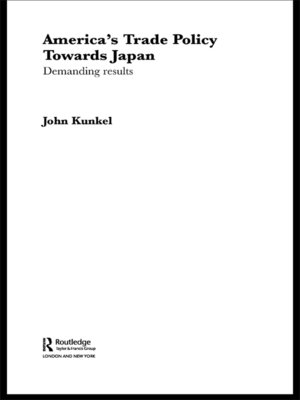America's Trade Policy Towards Japan
ebook ∣ Demanding Results · Routledge Advances in International Political Economy
By John Kunkel

Sign up to save your library
With an OverDrive account, you can save your favorite libraries for at-a-glance information about availability. Find out more about OverDrive accounts.
Find this title in Libby, the library reading app by OverDrive.



Search for a digital library with this title
Title found at these libraries:
| Library Name | Distance |
|---|---|
| Loading... |
In a few years, the United States has gone from worrying about Japan's economic might to worrying about its meltdown. The rise and fall of America's 'results-oriented' trade policy towards Japan captures this turnaround.
John Kunkel traces this Japan policy to a crisis in the institutions, laws and norms of the US trade policy regime in the first half of the 1980s. This arose from the erosion of America's post-war international economic dominance (especially vis-à-vis Japan) and the unintended consequences of Reaganomics. The crisis in turn led to the progressive ascendancy of a coalition of 'hardliners' over 'free traders' after 1985.
Kunkel combines research in economics, politics and history - including interviews with key policy-makers - to illuminate this important case study of American trade policy. His book offers theoretical insights and practical lessons on the forces shaping US trade policy at the start of the twenty-first century.
John Kunkel traces this Japan policy to a crisis in the institutions, laws and norms of the US trade policy regime in the first half of the 1980s. This arose from the erosion of America's post-war international economic dominance (especially vis-à-vis Japan) and the unintended consequences of Reaganomics. The crisis in turn led to the progressive ascendancy of a coalition of 'hardliners' over 'free traders' after 1985.
Kunkel combines research in economics, politics and history - including interviews with key policy-makers - to illuminate this important case study of American trade policy. His book offers theoretical insights and practical lessons on the forces shaping US trade policy at the start of the twenty-first century.







